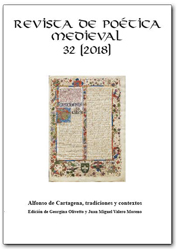Nuño de Guzmán’s corrections and interpolations in the epitome of Nicomachean ethics (s. XV)
DOI:
https://doi.org/10.37536/RPM.2018.32.0.64965Keywords:
Nuño de Guzmán, Alfonso de Cartagena, Nicomachean Ethics, Aristotle, Vernacular HumanismAbstract
The composition of the fifteenth-century epitome of Nicomachean Ethics has been illegitimately attributed to Alfonso de Cartagena and to Nuño de Guzmán. The attribution to the Bishop of Burgos is reflected in the incipit of the MSS/Cambridge University add. 8275, Madrid BNE 1204 and Vatican BAV Ottob. lat. 2054; whereas the authorship of Nuño de Guzmán has been deduced from his introduction to the MSS/Oxford, Bodleian Library Span.d.1. In order to reject both attributions, we will analyze the introduction of the epitome and claim that its origin is Aragonese. Finally, in order to assess the quality of Guzman’s interventions, an inventory of the corrections and interpolations and a list of omissions will be provided.
Downloads
Métricas alternativas
Downloads
Published
How to Cite
Issue
Section
License
The opinions and facts stated in each article are the exclusive responsability of the authors. The University of Alcalá is not responsible in any case for the credibility and aunthenticity of the studies.
Authors will retain the rights on their work, even if they will be granting the journal a non-exclusive right of use to reproduce, edit, distribute, publicly communicate and show their work. Therefore, authors are free to enter into additional, independent contracts for non-exclusive distribution of the works published in this journal (such as uploading them to an institutional repository or publishing them in a book), as long as the fact that the manuscripts were first published in this journal is acknowledged.
Works are published under the terms stipulated in the Attribution-NonCommercial-ShareAlike 4.0 International License (CC BY-NC-SA 4.0) that allows third parties to share the work under the following conditions:
Attribution — You must give appropriate credit, provide a link to the license, and indicate if changes were made. You may do so in any reasonable manner, but not in any way that suggests the licensor endorses you or your use.
NonCommercial — You may not use the material for commercial purposes.
ShareAlike — If you remix, transform, or build upon the material, you must distribute your contributions under the same license as the original.










